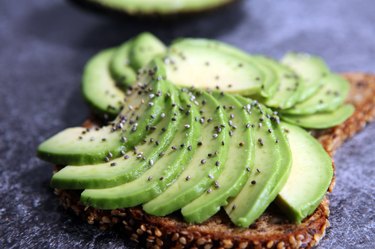
You need dietary fat for your body to function properly. Not only is fat a source of energy, but it's necessary for many vital biological and physiological processes in your body, including growth and development. It's important to manage the types of fat you consume, because not all fat is created equal. By eating 10 grams of fat, you may be contributing to optimal health or consuming more empty calories than necessary. It's the quality of that 10 grams of fat, more than the quantity, that's important for health.
Tip
Whether 10 grams of fat is a lot for a meal depends on the type of fat you eat and what other fats are included in your diet for the day. Your body weight also makes a difference, because that determines your RDA for fat.
Video of the Day
How Much Do You Need?
The amount of fat you should consume in a day depends on your calorie intake, which can vary according to how active you are, your weight, age and gender. The 2015-2020 Dietary Guidelines for Americans says to aim for a total fat intake of 20 to 35 percent of your daily calories. For example, at 2,000 calories per day, your suggested upper limit of total fat would be about 78 grams, says the Mayo Clinic.
Video of the Day
Read more: What Is a Good Body Fat Percentage?
Choose Unsaturated Fats
If that 10 grams of fat you eat for breakfast is unsaturated fat, it can provide some major health benefits. Monounsaturated and polyunsaturated fats help with the absorption of vitamins and with the production of vitamin E, says the FDA. They also insulate and cushion your body and support metabolism. Unsaturated fats are usually liquid at room temperature. Monounsaturated fats are found in foods such as vegetable oils (olive, canola and peanut oils), nuts and nut butters, and avocado.
Polyunsaturated fats are considered essential because they're required for normal body functioning, but they can't be made by your body and must come from your diet. Essential fats play a role in many body processes, including immune and nervous system function, blood clotting and blood pressure regulation. Polyunsaturated fat also comes from plant-based sources. Foods that contain polyunsaturated fat include sunflower seeds, corn, soybeans and nuts.
Limit Saturated Fat
Saturated fat comes from animal products and some tropical oils. It's the fat often associated with raising LDL cholesterol and increasing inflammation. If the 10 grams of fat in your meal includes a high percentage of saturated or trans fats, you need to monitor any other fat you add to your daily saturated fat intake to prevent a negative impact on your health.
The 2015-2020 Dietary Guidelines for Americans advises limiting your daily saturated fat intake to no more than 10 percent of your calorie consumption, which would be 22 grams if you're eating a 2,000-calorie-per-day diet. If your meal includes 10 grams of saturated fat, that would account for almost half of your recommended intake of saturated fat for the day.
For people who need to lower their cholesterol, the American Heart Association recommends that saturated fat should come from no more than 5 to 6 percent of your calories. For example, for a daily diet of 2,000 calories, no more than 120 of them should come from saturated fat, which equals about 11 to 13 grams of saturated fat per day. Foods high in saturated fats include fatty meats, full-fat dairy products, butter, palm and coconut oil, and baked goods.
Avoid Trans Fat
There are no safe levels of trans fats, so they shouldn't be a significant part of your diet. Trans fatty acids form as a result of hydrogenation, the transformation of a liquid fat to a solid fat. Food with trans fats include solid margarine, shortening, powdered and liquid flavored coffee creamers, and many prepackaged and processed foods.
Read more: Does Trans Fat Leave the Body?
Make Wise Fat Choices
Whether you're trying to lose weight, have a medical problem or just want to be healthy, the fats you choose to consume can make a difference. Limiting your intake of saturated fat can help improve your health as long as you replace it with good fats, especially those containing omega-3s, rather than refined carbs. In other words, don't go no fat, go good fat. The Academy of Nutrition and Dietetics offers great suggestions for incorporating healthy fats into your diet:
- Limit your intake of saturated fats by replacing some red meat with beans, nuts, poultry and fish.
- Eat more omega-3 fats, found in fish, walnuts, ground flaxseeds, canola oil and soybean oil.
- Cook with olive oil instead of stick margarine or shortening.
- Eat more avocados, which contain brain-healthy fats and are very filling.
- Add nuts to vegetable dishes and mix them with breadcrumbs for toppings.
- American Heart Association: Saturated Fat
- ChooseMyPlate.gov: Dietary Guidelines for Americans 2015-2020
- Mayo Clinic: To Track How Much Fat I Eat Each Day, Should I Focus on Grams, Calories or Percentages?
- FDA: Monounsaturated and Polyunsaturated Fat
- American Heart Association: The Skinny on Fats
- Cleveland Clinic: Fat: What You Need to Know
- Academy of Nutrition and Dietetics: Choose Healthy Fats